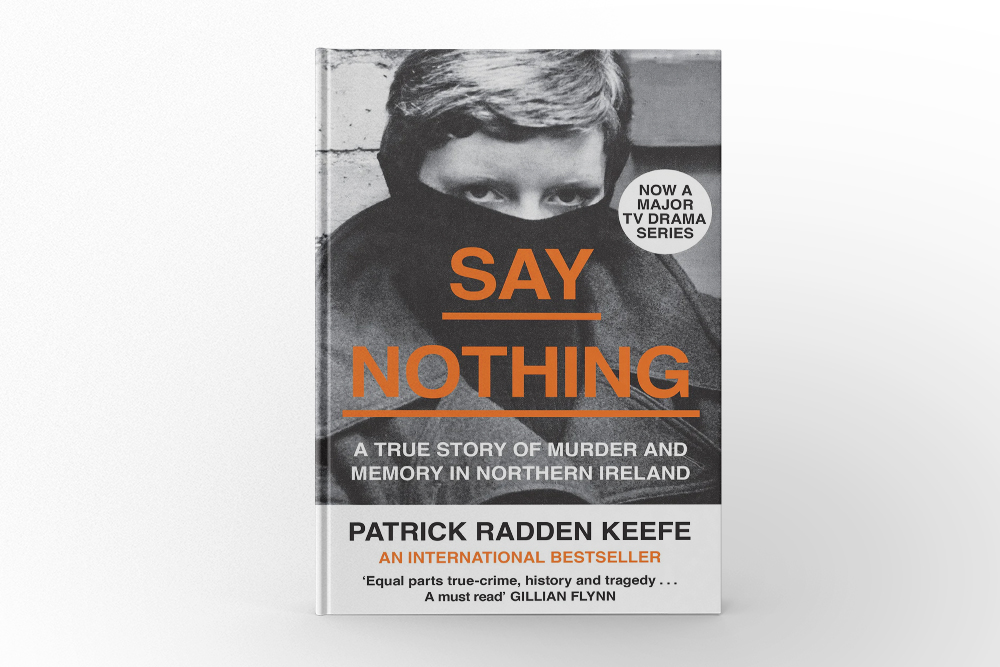Say Nothing by Patrick Radden Keefe is a gripping exploration of the Troubles, a violent conflict that plagued Northern Ireland for decades. This article delves into the intricate narrative of Say Nothing by Patrick Radden Keefe, highlighting its detailed recounting of historical events, the human stories at its core, and the profound themes it addresses. Through meticulous research and compelling storytelling, Keefe provides a nuanced perspective on a tumultuous period in Irish history.
Author’s Background
Patrick Radden Keefe is an award-winning journalist and author known for his investigative reporting and narrative nonfiction. Born in 1976, Keefe has written extensively for The New Yorker and authored several acclaimed books. His background in law and his keen investigative skills enable him to dissect complex issues and present them in a compelling and accessible manner.
Say Nothing by Patrick Radden Keefe, published in 2019, garnered widespread acclaim and won the 2019 Orwell Prize for Political Writing. Keefe’s deep dive into the Troubles is informed by extensive interviews, archival research, and a profound understanding of the political and social dynamics of the time. His ability to weave together individual stories with broader historical events makes Say Nothing a powerful and enlightening read.
In-Depth Summary
Say Nothing by Patrick Radden Keefe centers on the disappearance of Jean McConville, a mother of ten who was abducted from her home in Belfast in 1972. Her abduction and murder by the Irish Republican Army (IRA) serve as a focal point for the book, but Keefe uses this event as a lens through which to examine the broader conflict in Northern Ireland.
The book traces the roots of the Troubles, beginning with the civil rights movement of the late 1960s and the escalating violence that followed. Keefe introduces readers to key figures on both sides of the conflict, including Gerry Adams, the controversial leader of Sinn Féin, and Dolours Price, a dedicated IRA member who later became disillusioned with the cause.
Through the intertwined stories of these individuals, Keefe paints a vivid picture of the brutal realities of life in Northern Ireland during the Troubles. The narrative delves into the psychological toll of the conflict, the moral ambiguities faced by those involved, and the lingering scars left on the community.
Keefe’s meticulous attention to detail and his ability to humanize his subjects make the historical events resonate on a personal level. The book’s title, Say Nothing, reflects the culture of silence and fear that permeated Northern Ireland, where speaking out could have deadly consequences.
Themes and Insights
A comprehensive analysis of Say Nothing by Patrick Radden Keefe reveals several central themes that underscore the narrative. One of the primary themes is the interplay between memory and history. Keefe explores how the collective memory of the Troubles is shaped by personal experiences, political agendas, and the passage of time. The book raises questions about the reliability of memory and the ways in which history is constructed and reconstructed.
Another significant theme is the moral complexity of violence and political struggle. Keefe does not shy away from depicting the brutality and ethical dilemmas faced by those involved in the conflict. He examines the motivations and justifications for violence, as well as its devastating impact on individuals and communities. This nuanced portrayal challenges simplistic notions of heroism and villainy, highlighting the shades of grey in human behavior.
The theme of silence and its consequences is also prevalent throughout the book. The culture of secrecy and the fear of retribution created an environment where truth was often suppressed, and justice was elusive. Keefe’s investigation into Jean McConville’s murder and the broader context of the Troubles sheds light on the long-term effects of this enforced silence on individuals and society.
Recommendation
For readers interested in history, politics, and human stories, Say Nothing by Patrick Radden Keefe is a must-read. Its detailed exploration of the Troubles, combined with its compelling narrative style, makes it both informative and engaging. Keefe’s ability to connect personal stories with broader historical themes ensures that the book resonates on multiple levels.
Whether you are well-versed in the history of Northern Ireland or new to the topic, Say Nothing offers valuable insights and a deeply human perspective on a complex and often misunderstood conflict. Keefe’s rigorous research and empathetic storytelling make this book an essential addition to the canon of literature on the Troubles.
Conclusion
In conclusion, Say Nothing by Patrick Radden Keefe is a masterful work of narrative nonfiction that sheds light on one of the darkest chapters in recent history. Through its detailed recounting of the Troubles and its focus on individual experiences, the book offers a profound exploration of memory, violence, and the quest for justice. For those seeking to understand the complexities of the Northern Irish conflict, Say Nothing is an indispensable resource.
Keefe’s meticulous research, combined with his ability to craft a compelling narrative, ensures that Say Nothing is both an enlightening and moving read. As we reflect on the stories of those who lived through the Troubles, we are reminded of the enduring impact of history on our lives and the importance of seeking truth and reconciliation.
